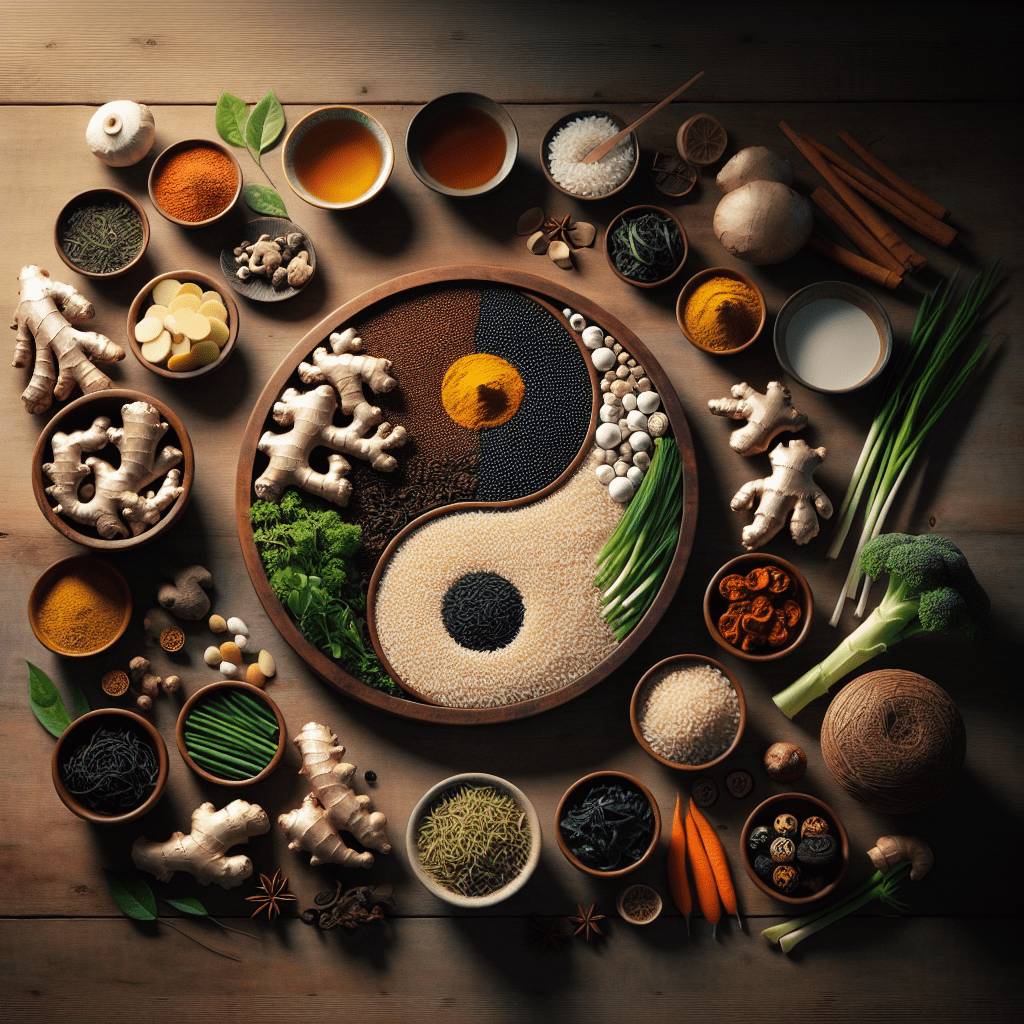Have you ever noticed how your friend can eat practically anything and stay slim, while you seem to gain weight just by looking at a cookie? Or why certain foods leave you feeling energized while others make you sluggish, even though their calorie counts are similar? If you’ve been counting calories religiously without seeing results, Eastern medicine might have the answer you’ve been searching for.
The truth is, when it comes to nutrition, we’re not all created equal. Traditional approaches to dieting in the Western world often focus heavily on calorie counting and one-size-fits-all meal plans. But these methods overlook something crucial: your unique constitutional makeup.
Eastern medicine, particularly Traditional Chinese Medicine (TCM), has recognized for thousands of years what modern nutritional science is only beginning to understand – that each person has a distinct constitutional type that influences how their body processes and responds to different foods. This ancient wisdom forms the foundation of truly holistic diet plans that go beyond simple calorie calculations to nurture your body according to its specific needs.
Understanding Constitutional Types in Traditional Chinese Medicine
In TCM, your body constitution isn’t just about whether you’re tall or short, thin or stout. It’s a comprehensive assessment of your physical, emotional, and energetic characteristics that determine your natural tendencies toward health or imbalance.
There are several primary constitutional types in TCM, each with distinct dietary needs. For example, a “Yang Deficiency” constitution tends to feel cold easily, has lower energy levels, and might experience water retention. By contrast, a “Yin Deficiency” type often feels warm, may experience dry skin, and tends toward restlessness or anxiety. Research has identified balanced constitutions and eight types of unbalanced constitutions in TCM.
What makes the holistic diet plan approach so revolutionary is how it considers the energetic properties of foods – not just their vitamin content or calorie count. In TCM, foods are classified as having “hot,” “warm,” “neutral,” “cool,” or “cold” energies that can either balance or exacerbate your constitutional tendencies.
Let’s look at some practical examples:
- If you have a “Yang Deficiency” constitution, warming foods like ginger, cinnamon, lamb, and sweet potatoes can help boost your energy and warm your core.
- For “Yin Deficiency” types, cooling foods such as watermelon, cucumber, tofu, and leafy greens can help balance excessive heat and calm the system.
- Those with a “Qi Stagnation” constitution might benefit from foods that promote movement and circulation, like citrus fruits, moderately spicy foods, and leafy greens.
The wisdom here isn’t just theoretical – it’s intensely practical. When a person with a “Damp” constitution (characterized by feelings of heaviness, foggy thinking, and fluid retention) avoids dairy, refined sugars, and alcohol while embracing bitter greens, warming spices, and lean proteins, they often experience noticeable improvements in energy, mental clarity, and weight management.
Personalized Nutrition: The Key to Optimal Health
Creating a holistic diet plan tailored to your constitutional type isn’t about following a rigid set of rules – it’s about developing an intuitive understanding of what your body needs to thrive. When you eat according to your constitution, digestion improves, energy stabilizes, and many people report better emotional well-being too.
This personalized approach explains why your coworker thrives on a high-protein diet while you might feel bogged down by it. It’s not that one diet is inherently better than another – it’s that different constitutional types require different nutritional approaches. This principle forms the foundation of what experts call a constitution-based diet.
Take digestion, for instance. In Eastern medicine, proper digestion is considered the foundation of good health. If you have a naturally “cold” digestive system (signs include bloating after meals and preference for warm foods), adding warming spices like ginger, cinnamon, and cardamom to your meals can dramatically improve nutrient absorption and reduce discomfort – without changing a single calorie in your diet.
A holistic diet plan also takes into account how seasons affect your constitutional needs. During winter, almost everyone benefits from more warming, cooked foods, while summer calls for lighter, cooling options. This seasonal adjustment is something our ancestors understood intuitively but has been largely lost in modern nutrition.
Beyond food choices, a truly holistic approach considers lifestyle factors that affect how your body processes nutrition. Stress management techniques, appropriate exercise, and even eating patterns play crucial roles. For instance:
- “Fire” constitutional types might benefit from calming exercises like yoga and meditation, along with regular meals that include cooling foods to prevent burnout.
- “Earth” types often do well with gentle, consistent exercise routines and regular meal times that support their tendency toward stable energy.
- “Metal” constitutions might thrive with more structured fitness regimens and cleaner, simpler meals that support their innate appreciation for order.
The beauty of this approach is how it honors your individuality while providing practical guidance. Instead of fighting against your natural tendencies, a holistic diet plan works with them, creating harmony rather than resistance.
Bridging East and West: Integrated Nutritional Wisdom
The good news is that we don’t have to choose between Eastern wisdom and Western nutritional science – the most effective holistic diet plans integrate both perspectives. Western nutrition excels at identifying specific nutrients, understanding caloric needs, and recognizing food allergies or sensitivities. Eastern approaches excel at seeing patterns of imbalance and understanding how foods affect your energy and constitution.
When combined, these traditions create a comprehensive approach to nutrition that addresses both the physical and energetic aspects of food. For example, Western nutrition might identify that you need more iron in your diet, while Eastern medicine might guide you toward easily digestible iron sources that align with your constitutional needs.
This integration is especially powerful when addressing common health concerns. Take inflammation, for instance. Western nutrition might recommend an anti-inflammatory diet rich in omega-3 fatty acids and antioxidants. Eastern medicine would personalize this approach by recommending specific anti-inflammatory foods that also balance your constitutional tendencies – cooling anti-inflammatory foods for “Heat” types versus warming anti-inflammatory options for “Cold” types.
The cultural relevance of holistic diet plans extends beyond physical health. In Eastern traditions, food has always been seen as medicine that nourishes not just the body but also the mind and spirit. This interconnection recognizes that what we eat affects our emotions, mental clarity, and even spiritual well-being. The food as medicine approach has been central to Eastern healing practices for millennia.
As Zoey Xinyi Gong, a practitioner who works with TCM food therapy, emphasizes, traditional Eastern cuisine is inherently healing and nutrient-dense. These culinary traditions developed over thousands of years with an intuitive understanding of how foods affect our constitutional balance.
By embracing this integrated approach, we can move beyond the limitations of diets focused solely on weight loss or isolated health metrics. Instead, we can create nutritional plans that support our whole being – physical, emotional, and energetic.
Discovering Your Constitutional Type with Modern Tools
If you’re intrigued by the concept of constitutional types and holistic diet plans, you might be wondering how to determine your own type. Traditionally, this would require consultation with an experienced TCM practitioner who would assess various aspects of your appearance, pulse, tongue, and symptoms to determine your constitution.
Today, however, technology has made this ancient wisdom more accessible than ever. Tools like EASTCHI AI from HerbalsZen offer a modern bridge between traditional Eastern medicine and contemporary life. This innovative platform analyzes your constitutional type through the lens of Five Element Theory, providing personalized nutrition recommendations and lifestyle guidance based on your unique makeup.
What makes this approach revolutionary is how it combines the time-tested wisdom of Eastern medicine with the precision and accessibility of modern technology. Instead of generic dietary advice, you receive recommendations specifically tailored to your constitutional needs, the current season, and your health goals. This integration represents what some experts call AI TCM modernization – a promising frontier in personalized healthcare.
The system recognizes that food truly is medicine – but that the right “prescription” depends entirely on your individual constitution. By embracing this personalized approach, you can transform your relationship with food from one of restriction and calorie-counting to one of nourishment and balance.
Exploring your constitutional type isn’t just about improving physical health – it’s about gaining deeper insight into your natural tendencies and learning to work with them rather than against them. Many people report a sense of relief when they discover their constitutional type, as it helps explain lifelong patterns and tendencies that previously seemed mysterious.
Embracing a Balanced, Constitutional Approach
The holistic diet plan revolution isn’t about rejecting modern nutritional science or blindly following ancient practices. It’s about integrating the best of both worlds to create a truly personalized approach to nutrition that honors your unique constitution.
By understanding that your body type matters more than calories alone, you can begin to make food choices that genuinely support your health and vitality. You might discover that certain foods you’ve been told are “healthy” actually create imbalance in your specific constitution, while others you’ve been avoiding might be exactly what your body needs.
This approach also liberates us from the cycle of fad diets and one-size-fits-all nutritional advice. When you eat according to your constitutional needs, food becomes a source of nourishment and pleasure rather than confusion or restriction.
If you’re ready to explore a more personalized approach to nutrition, consider investigating tools like EASTCHI AI that can help you understand your constitutional type and provide guidance tailored to your specific needs. By embracing the wisdom of Eastern medicine while benefiting from modern technological advances, you can discover a way of eating that truly supports your unique constitution.
The revolution in holistic diet plans isn’t about finding the perfect diet for everyone – it’s about finding the perfect diet for you, based on an understanding of your constitutional nature that goes far deeper than calories alone. When you honor your body’s inherent wisdom and constitutional needs, true health and balance naturally follow.



